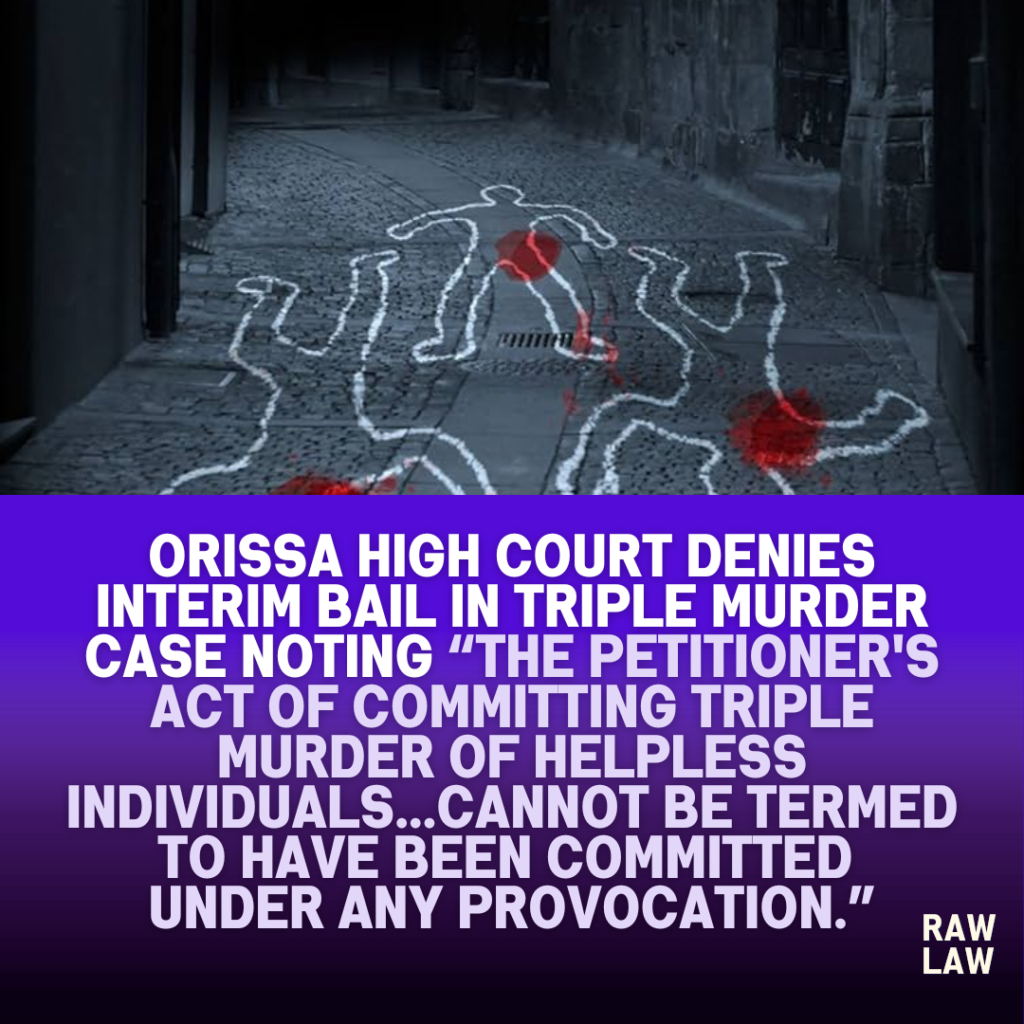Court’s Decision
The Orissa High Court dismissed the petition seeking interim bail on the grounds of illness and delay in hearing of the appeal. The Court found no justification for release considering the gravity and brutal nature of the crime — a triple murder involving helpless and unarmed victims. It concluded that neither delay in disposal of appeal nor the petitioner’s medical condition were sufficient to override the seriousness of the crime.
Facts
The appellant had been convicted by the trial court for committing the murder of three individuals. He filed a criminal appeal challenging his conviction and simultaneously sought interim bail citing prolonged illness and lack of proper medical treatment in custody. He argued that there was delay in the disposal of the criminal appeal, and requested release on these grounds. The prosecution opposed the bail, citing the heinous nature of the offence, the gravity of the crime, and the threat to society if the petitioner were released.
Issues
- Whether the illness of the appellant, allegedly due to non-availability of proper treatment in jail, entitles him to interim bail during the pendency of the appeal.
- Whether delay in disposal of the appeal justifies release on interim bail in a case involving conviction for a grave offence such as triple murder.
Petitioner’s Arguments
The petitioner contended that he was suffering from various ailments and that the jail authorities were not providing adequate treatment. He submitted medical records in support and claimed that prolonged custody was aggravating his health condition. Further, he submitted that there had been considerable delay in the disposal of the appeal, and that he had already undergone substantial imprisonment, thereby meriting interim bail.
Respondent’s Arguments
The State argued that the petitioner had been convicted of a heinous and gruesome crime — murdering three helpless individuals. It was submitted that the crime was committed in a premeditated manner and there was no provocation. The prosecution emphasized that the nature and gravity of the offence precluded any leniency. Moreover, the State contended that adequate medical facilities were being provided in jail and the petitioner could be treated as per jail norms without releasing him on bail.
Analysis of the Law
The Court examined the principles governing grant of interim bail during the pendency of appeal. It relied on the balance between individual rights and societal interest, particularly in the context of serious offences. The Court emphasized that mere illness or delay cannot automatically justify interim bail, especially when the crime involves extreme brutality and the sentence is life imprisonment.
Precedent Analysis
The Court referred to:
- Kalyan Chandra Sarkar v. Rajesh Ranjan @ Pappu Yadav, (2004) 7 SCC 528, wherein it was held that seriousness of the offence, and the possibility of the accused repeating similar offences must be considered.
- State of U.P. v. Amarmani Tripathi, (2005) 8 SCC 21, reiterating that gravity of the offence, circumstances of the crime and criminal antecedents are significant factors in bail applications.
- The Court also acknowledged general principles governing interim bail but stressed that these must be carefully weighed against the nature of the offence.
Court’s Reasoning
The Court found that the act committed by the petitioner was of extreme brutality. The observations in the trial court’s judgment were noted, including how the victims — two women and one child — were helpless and unarmed. The act was deliberate and not committed under provocation. The Court held that “Such an act cannot be overlooked by this Court in considering a plea for interim bail.”
Regarding the claim of illness, the Court reviewed the medical records and directed that the petitioner could be treated in a government hospital or jail hospital as per requirement. It stated: “We are of the view that merely because the appellant is suffering from illness and has remained in custody for a long period, is not a ground to release him on interim bail.”
Conclusion
The Court dismissed the interim bail application, observing that the petitioner’s continued incarceration was justified due to the heinousness of the offence. It also noted that adequate medical treatment could be ensured through jail authorities and that delay in disposal of appeal was not an exceptional circumstance in this case.
Implications
This judgment underscores the judiciary’s consistent approach that heinous crimes, particularly those involving multiple murders, will not be met with leniency even during the pendency of appeals. It affirms that bail on grounds of illness must be substantiated with exceptional circumstances and that delay in appeal disposal alone is not sufficient to grant bail in cases involving serious crimes.
Referred Cases and Their Relevance
- Kalyan Chandra Sarkar v. Rajesh Ranjan – Highlighted the principle that seriousness of the crime and likelihood of future misconduct weigh against bail.
- State of U.P. v. Amarmani Tripathi – Emphasized that nature of allegations and circumstances of the offence are crucial for bail considerations.
These cases reinforced the Court’s view that triple murder cannot be lightly viewed for interim bail.
Frequently Asked Questions (FAQs)
1. Can interim bail be granted solely on the basis of prolonged illness during custody?
No. The Court held that unless illness is of exceptional nature and cannot be treated in custody, it cannot be a sole ground for interim bail.
2. Is delay in hearing of appeal a sufficient ground for granting interim bail?
No. The Court stated that mere delay does not justify bail in heinous crimes like triple murder.
3. What factors weigh against granting bail in murder convictions?
Gravity of the offence, deliberate nature of the act, vulnerability of the victims, and societal interest are critical factors against grant of bail.



